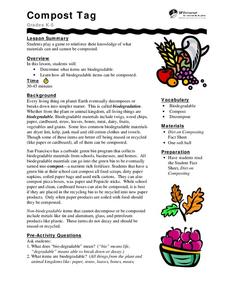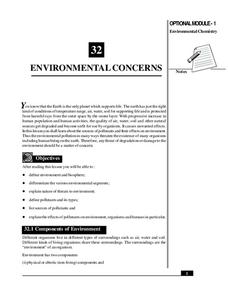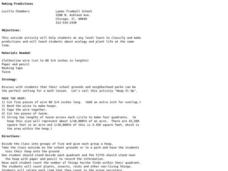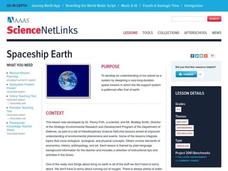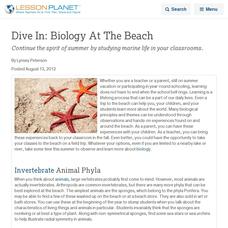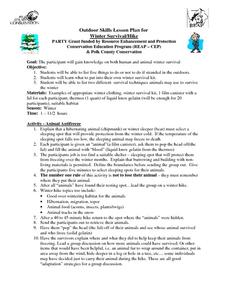Curated OER
Forest Ecosystem
Students become familiar with the temperate rainforest. In this forest ecosystem lesson, students identify the producers, consumers and decomposers in the forest ecosystem. Students sort cards and identify the trophic level of the...
Curated OER
Worms! Nature's Recyclers
Third graders explore the process of composting. In this composting lesson, 3rd graders read the book Wonderful Worms, and create composters.
Curated OER
Email Riddles
Students compose riddles that are shared in a chat session conducted on their local school network. Students create clues that describe a specific animal or object. They watch as their words are typed onto the chat screen and sent to the...
Curated OER
Venus Flytrap
Students study the Venus Flytrap including its habitat and how it eats. In this ecology lesson students complete several experiments using a Venus Flytrap to see how it reacts to various conditions.
Curated OER
Happy Habitats
Students explore different habitats. In this habitat lesson plan, students investigate four different habitats through participating in a WebQuest. Students create an animal web using Kidspiration or a video documentary upon completing...
Curated OER
Web of Life - Role-Playing
Students role-play how organisms adapt to their environment. They play 20 questions with plant and animal habitats. They create a web of life to demonstrate how each plant and animal relies on the other for survival.
Curated OER
Ecosystem Vocabulary
In this ecosystem activity, students read descriptions and match the appropriate vocabulary term using ecosystem, habitat, community, and population. Students identify ten vocabulary terms.
Curated OER
Aquatic Science
What a terrific way to explore the pond habitat! Learners discuss the animal and plant life found in the Long Island area. They also discuss vocabulary terms, identify pollution concerns, and resource conservation.
Curated OER
Cycles of Life in an Urban Habitat: Changes in Biodiversity
Second graders compare and contrast animate and inanimate objects. For this environmental science lesson, 2nd graders create simple food webs. They observe their environment and create a collage about it.
SF Environment
Compost Tag
Composting is a great way to get children involved in recycling. First, they discuss how biodegradable products decompose to make compost. Then, they talk about what can and cannot be composted. They play a game similar to around the...
Center Science Education
The Nitrogen Cycle Game
Earth science experts learn about the roles of nitrogen by taking a virtual journey through the nitrogen cycle. Completing a passport worksheet along the way, they move from place to place around the classroom by the toss of dice. Each...
National Institute of Open Schooling
Environmental Concerns
Every year, more than 14 billion pounds of garbage is dumped into the oceans of the world, most of which is plastic and toxic to ocean life. Lesson 32 in the series of 36 focuses on environmental concerns, specifically pollution. Under...
Curated OER
Sand Travels
Students examine how sand is formed by erosion and that it can be moved by streams, rivers, and ocean currents in this unit of lessons. They study waves and currents, and structures that change how sand moves by creating story charts,...
Curated OER
Making Predictions
Students collect and classify items. In this making predictions lesson, students go outside and collect specimens of plants, insects and minerals. They classify each item and place them in a Venn Diagram. Students compare and contrast...
Curated OER
Habitat Sunprints
Young scholars recognize various habitats and where they are found. In this habitat sunprints lesson, students observe the contents of habitats and record what the sunprint might represent. Young scholars use blueprint paper and small...
Curated OER
Save a Reef!
Design a public information campaign to improve understanding of the coral reef crisis. Read about and discuss the biology and threats to the coral reef. The class creates a public information program about the problems facing the coral...
Curated OER
Fossil Fuels Summary
As the title suggests, this is a simply summary of fossil fuels. There are no questions to answer or problems to solve, just notes about fossil fuels. The notes cover how fossil fuels are formed, how we extract it, what humans use it...
Curated OER
Spaceship Earth
Students develop an understanding of our planet as a system by designing a very-long-duration space mission in which the life-support system is patterned after that of earth.
LABScI
Population Dynamics: The Predator-Prey Lab
Wolves eat better when the bunny population increases, but how long does that last? A series of 12 biology lessons uses the sixth installment to explore the predator-prey relationship between bunny and wolf populations. Young scientists...
Curated OER
Dive In: Biology At The Beach
Continue the spirit of summer by studying marine life in your classrooms.
Curated OER
Minerals of the Earth
Unearth this gem of a resource to use in your geology unit! With colorful images, bullet-point text, and links to related videos, it deals with the characteristics, properties, and identification of minerals. There are also slides...
Polk County Education
Winter Survival/Hike
Hibernation isn't just about staying fed, it's about staying warm. Young environmentalists explore the importance of staying warm in the wilderness with a short lesson about surviving in the wild. Using gelatin to represent warm-blooded...
Curated OER
Ecology Terms Crossword
In this ecological principles worksheet, students solve 20 clues in a crossword puzzle containing basic ecology definitions of organism interactions.
Curated OER
The good microbes
The question posed for the class to consider; What would decay and what would not? They read the short passage on decomposition and microbes, then mark the items that would decay after a two-week period. A scientific investigation idea...











